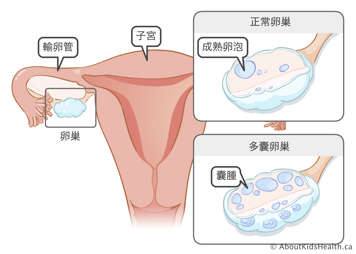什麽是 PCOS?
PCOS 是一種荷爾蒙失調現象。它是由于大腦和卵巢荷爾蒙失衡引起的。引起這種失衡的原因仍然未研究出來。
通常情况下,卵巢分泌出雌性激素和黃體酮,這些是女性荷爾蒙。卵巢同時也分泌出雄性激素,這是男性荷爾蒙。在 PCOS 情况下,卵巢分泌過多的雄性激素。這就導致荷爾蒙失衡,對身體産生很多影響。這些影響可能輕微、也可能很嚴重。
每 10 名婦女中就有 1 人受 PCOS 影響。
與所有慢性疾病一樣,PCOS 會在一定程度上影響你的生活。但是如果你照顧好自己的身體幷按照醫生建議進行治療,PCOS 産生的麻煩會很小。其他人甚至根本注意不到其存在。
PCOS 是 Polycystic Ovaries Syndrome 的縮寫(中文:多囊性卵巢症候群)
"Polycystic(多囊的)"表示"many cysts(很多囊)"。

卵巢排出携帶卵子的極小液囊。這些液囊稱爲卵泡或包囊。在每個月的女性生理循環中,成熟的卵泡包括卵泡破裂和卵泡釋放。這個過程稱爲排卵。
存在 PCOS 的女性,大腦不能向卵巢傳遞荷爾蒙信號,從而無法促使卵子的成熟和釋放。正因爲如此,排卵次數很少或根本沒有。卵泡在卵巢內會形成很多小囊,而不是破裂。
PCOS 迹象開始于女孩應有的第一個月經期
當女孩應有的第一個月經期時,通常會在這段時間第一次關注 PCOS。由于多餘的雄性激素,存在 PCOS 的女性極少或沒有經期。
其他 PCOS 的可能徵兆包括:
- 臉部或身體汗毛不正常生長
- 很難保持健康體重
- 粉刺
- 卵巢存在很多小囊(多囊性卵巢)
- 血脂(脂肪)含量增長
- 胰島素或葡萄糖含量增長
- 血液中雄性激素增長
幷非所有女性都有以上全部迹象。
PCOS 是通過查看病人病史、檢查和血液測試檢查出來的。
沒有專門檢查 PCOS 的測試。醫生會就下列問題向你提問:
- 你的經期
- 頭髮和皮膚問題
- 沒有緣由的體重增長
- 以前的健康狀况(你的病史)
醫生或護士會爲你測量體重、身高和血壓。
他們會給你抽血樣。血液檢查包括對胰島素、荷爾蒙和葡萄糖含量的檢查。
醫生同樣也會對你的卵巢進行超聲波掃描來檢查包囊。
PCOS 能被控制住,而其影響也可减弱
PCOS 目前尚無法治愈。但是可以對其進行治療和控制。治療 PCOS 有兩個重要原因:
容貌
很多存在 PCOS 的年輕女性會擔心失調對其容貌的影響。這是可以理解的。 對 PCOS 的治療能够减少其對你容貌的影響。這會讓你的自我感覺好一些。
長期健康
如果不對其進行治療,PCOS 會增加其他健康疾病的風險。這些健康問題包括:
- 心臟疾病
- 糖尿病
- 肥胖
- 子宮內膜癌
- 不孕不育(很難懷孕)
治療 PCOS
怎樣治療 PCOS 取决于你的發病迹象。
由于 PCOS 常導致體重增長,你應健康飲食。你要天天鍛煉。
對荷爾蒙的治療
PCOS 是荷爾蒙失調,所以對于 PCOS 的治療部分應包括儘量保持荷爾蒙平衡。 有兩種方法可以達到這個效果:
- 增加體內女性荷爾蒙含量
- 减弱男性荷爾蒙增加的影響
爲增加女性荷爾蒙的含量,你的醫生可能會爲你開避孕藥。避孕藥有以下作用:
- 促使你的經期更加正常
- 改善粉刺幷减少臉部和身體毛髮的生長
- 降低患子宮內膜癌的風險
爲减弱男性荷爾蒙的影響,你的醫生會爲你開抗雄激素藥物。抗雄激素藥物有以下作用:
- 阻擋男性荷爾蒙在人體內活動
- 减少不想要的毛髮生長和粉刺
一種常見的抗雄激素藥物叫做安體舒通。如果你正在服用該藥物,那麽你也需服用避孕藥。一些避孕藥能够對抗雄性激素也能够增加雌性激素。
由于 PCOS 患上糖尿病,你也需要對糖尿病進行治療。
除去不想要的毛髮
適當的荷爾蒙平衡能够幫助停止不需要的毛髮的生長。但不能够除去已經生長出來的毛髮。但有幾種方法能够除去已經生長出來的毛髮。請咨詢醫生。
PCOS 和懷孕
很多存在 PCOS 的女性都很難懷孕。其他一些却沒有這種困難。PCOS 的迹象之一是卵巢內小囊的生長。但是存在 PCOS 的女性,其子宮和卵子通常都是正常的。
如果你想懷孕,請咨詢醫生。有些治療能够增加你懷孕的機會。
要點
- PCOS 是一種影響一些女性的荷爾蒙失衡。
- PCOS 的迹象包括經期不正常或無月經。
- 其他迹象包括體重增長、不想要的毛髮生長以及粉刺。
- PCOS 通常采用荷爾蒙治療。這些能够减弱失調對你的容貌和身體的影響。
- 如果不對其進行治療,PCOS 將會導致不孕、心臟疾病和子宮內膜癌。